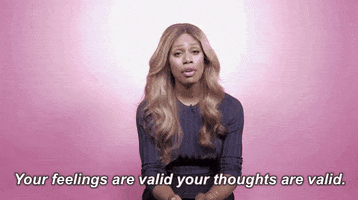How to Tell Someone About Your Eating Disorder
Here are some tips that can help you through the process
If there is something as hard as having an eating disorder, it is telling someone about it. Doing this talk with people who are close to you is strangely difficult, considering the fact that your eating disorder is actually a mental illness that you have no control over. (Would it be difficult to tell someone that you have a broken arm? I don’t think so.)
There may be many reasons for the talk being so difficult. You may feel ashamed to talk about your eating disorder out loud. I know the humiliation you can feel when telling someone you are eating until you are stuffed, then puke all of it. You may be afraid of what may follow after such a talk. I know the guilt you feel when telling your parents that you have an eating disorder because you feel like you have disappointed them. Trust me, I know.
On the other hand, I am also aware of how helpful social support can be in eating disorder recovery. How therapeutic it is to know that your mother and father will do anything they can to help you feel better. How healing it is to have your partner stand by your side when you are stressed out about eating a whole burger. How relieving it is to know that you can text your best friend to share how upset you feel because you just purged.
Because of all this, I am a strong advocate of sharing what you are going through, so that you can get the support and help you need and deserve.
‘‘How can I do that? I cannot just drop this bomb on them?!’’,
you may ask. Here are 9 tips to help you get through the talk.
1) Don’t wait.
Please, please, please. Do not wait until you get sicker. Do not wait for it to get worse. This is a personal regret of mine, not seeking help earlier. Studies on eating disorders show that the earlier the intervention, the better. This would have saved me at least three years of suffering. I waited until the point that I could not take it anymore. This made it more difficult to recover, as my eating disorder was already deeply embedded in my life by the time I was able to get proper help.
2) Choose the person carefully.
Keep in mind that not everyone will be open to understanding what you are going through. They may get defensive, play the victim (commonly seen in parents) or make it about them and their experience (with friends).
Also, not everyone can show you the empathy you need. As you will be vulnerable with this person, make sure to choose the right person and that it is someone you can trust. If you receive any negative reactions or you simply do not receive the reaction you were expecting, you might find yourself feeling lonely and hopeless. It may also keep you from opening up to someone else in the future.
3) Set your expectations (realistically).
Before having the talk ask yourself, what do you expect from this conversation? How do you want to feel after it? Is this person capable of understanding your situation and showing you empathy?
You may be asking for help or you may just be looking for someone to talk to. Either way, setting your expectations before will allow the conversation to go more smoothly, as you can talk to them according to your expectations. This will also aid in communicating your needs to them.
4) Talk to them in person.
As I mentioned earlier, talking about your eating disorder around others can be quite a challenge. Thus, you may be more inclined to talk over text; which makes it easier to talk about sensitive topics. Unless it makes you feel so uncomfortable that you think you will not be able to survive it, I really suggest talking to them in person. This will allow you to have a more sincere and bonding experience while avoiding any misunderstandings. If you are still not convinced that you can do the talk, you can try writing them a letter!
5) Tell them how you feel about the conversation.
Start by telling them how you feel about talking to them. Doing this straight away can help set the tone and also elicit some empathic response in them. Try to be as transparent as possible. Most likely, sharing your eating disorder with them was a tough decision to make, to begin with. It’s only natural that you are feeling anxious and uncomfortable. Make sure to let them know that it took some time for you to build up the courage to talk to them.
6) Start with simple sentences (then more detail, if you feel comfortable).
Eating disorders are complex mental illnesses. When we try to open up, there are so many points to touch upon that you do not know where to start. But it doesn’t have to be complicated. Actually, it is better if you simplify it at first. You can start by saying ‘‘I realized that I have been struggling with food lately’’ or ‘‘I feel like I need help about…’’. If you later feel comfortable enough and feel like opening up more, you can go into more detail about what is going on.
7) Trust yourself. Listen to your body.
Two common things with individuals who struggle with eating disorders are dismissing their feelings and invalidating their experiences. From the beginning, we are well aware of something being wrong (well not always, people with anorexia nervosa may be oblivious to their disorder), however, we always tell ourselves ‘‘it’s nothing’’. It is something. Trust your experience. You know what you are going through best. Never let anyone convince you otherwise.
8) Tell them what you expect from them.
Hearing about someone’s struggles, especially someone who you care a lot for, can be very overwhelming. People may also react negatively if they do not know how they should treat the situation or what is expected of them. Tell them clearly what your expectations are: do you want them to just be there for you? Do you want them to get you help? This is why you should also set your expectations before the talk.
9) Prepare yourself for questions.
The person in front of you may not know much about eating disorders. They may want to better understand what you are going through. They will probably ask you a lot of questions. Some questions may be triggering, so prepare yourself for those and the emotions that might come with them. This is not to say that you should be stressed about answering all of their questions. But answering them as much as possible can help you get help more quickly and in the best way possible.
Remember, a negative reaction has nothing to do with you.
Sadly, you cannot always predict how someone will react. It might be really upsetting to receive negative reactions when you are feeling vulnerable. But it’s good to remember: any negative reaction they give is about them and not you. Your eating disorder is valid no matter what. And you can always try talking to someone else.
Good luck everyone, Realistic Body Therapist believes in you!







